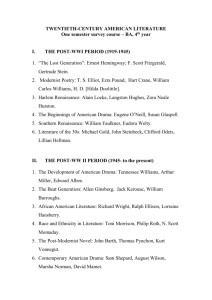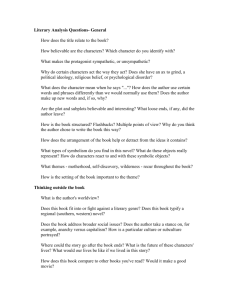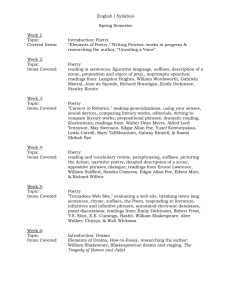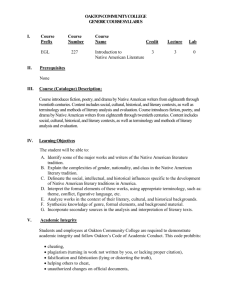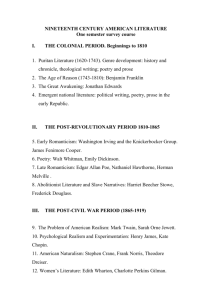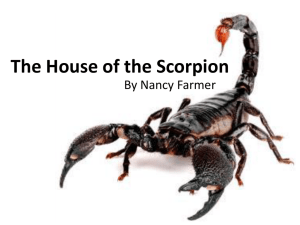English 152 Syllabus.doc - english15108
advertisement
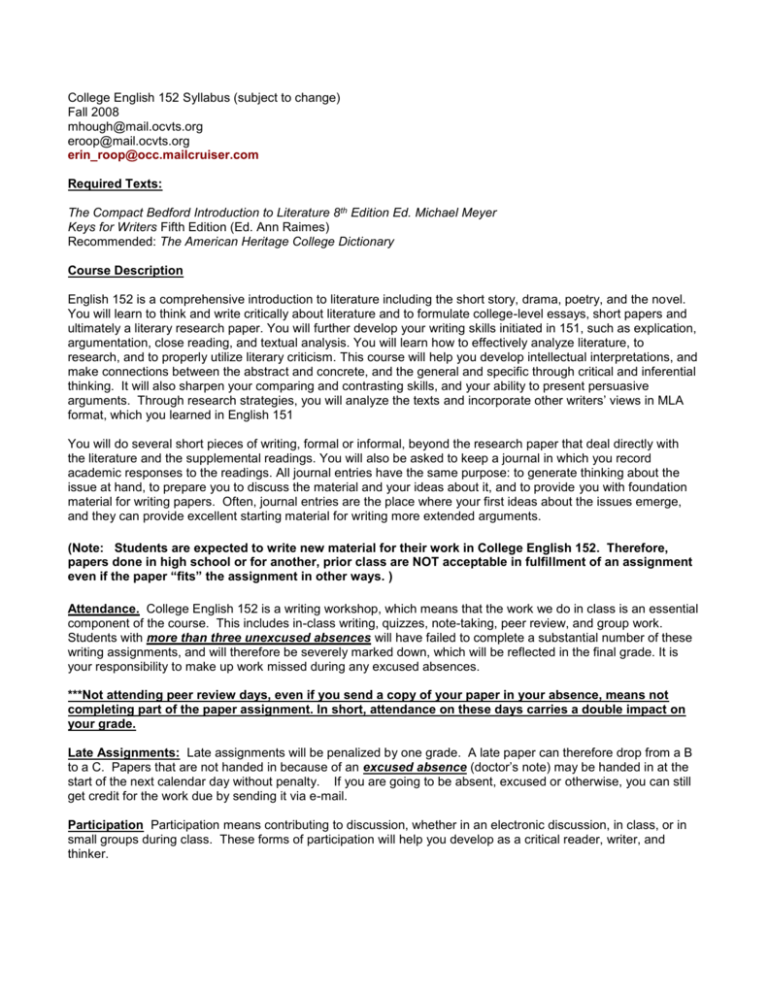
College English 152 Syllabus (subject to change) Fall 2008 mhough@mail.ocvts.org eroop@mail.ocvts.org erin_roop@occ.mailcruiser.com Required Texts: The Compact Bedford Introduction to Literature 8th Edition Ed. Michael Meyer Keys for Writers Fifth Edition (Ed. Ann Raimes) Recommended: The American Heritage College Dictionary Course Description English 152 is a comprehensive introduction to literature including the short story, drama, poetry, and the novel. You will learn to think and write critically about literature and to formulate college-level essays, short papers and ultimately a literary research paper. You will further develop your writing skills initiated in 151, such as explication, argumentation, close reading, and textual analysis. You will learn how to effectively analyze literature, to research, and to properly utilize literary criticism. This course will help you develop intellectual interpretations, and make connections between the abstract and concrete, and the general and specific through critical and inferential thinking. It will also sharpen your comparing and contrasting skills, and your ability to present persuasive arguments. Through research strategies, you will analyze the texts and incorporate other writers’ views in MLA format, which you learned in English 151 You will do several short pieces of writing, formal or informal, beyond the research paper that deal directly with the literature and the supplemental readings. You will also be asked to keep a journal in which you record academic responses to the readings. All journal entries have the same purpose: to generate thinking about the issue at hand, to prepare you to discuss the material and your ideas about it, and to provide you with foundation material for writing papers. Often, journal entries are the place where your first ideas about the issues emerge, and they can provide excellent starting material for writing more extended arguments. (Note: Students are expected to write new material for their work in College English 152. Therefore, papers done in high school or for another, prior class are NOT acceptable in fulfillment of an assignment even if the paper “fits” the assignment in other ways. ) Attendance. College English 152 is a writing workshop, which means that the work we do in class is an essential component of the course. This includes in-class writing, quizzes, note-taking, peer review, and group work. Students with more than three unexcused absences will have failed to complete a substantial number of these writing assignments, and will therefore be severely marked down, which will be reflected in the final grade. It is your responsibility to make up work missed during any excused absences. ***Not attending peer review days, even if you send a copy of your paper in your absence, means not completing part of the paper assignment. In short, attendance on these days carries a double impact on your grade. Late Assignments: Late assignments will be penalized by one grade. A late paper can therefore drop from a B to a C. Papers that are not handed in because of an excused absence (doctor’s note) may be handed in at the start of the next calendar day without penalty. If you are going to be absent, excused or otherwise, you can still get credit for the work due by sending it via e-mail. Participation Participation means contributing to discussion, whether in an electronic discussion, in class, or in small groups during class. These forms of participation will help you develop as a critical reader, writer, and thinker. Journals: These journals are not a place for exploring your emotions. This is not a diary, but an intellectual exercise. Your journal entry should identify the question you are answering, offer your own conclusions, and provide the reasoning that got you to those conclusions. Well-documented specific quotations and examples from the text strengthen the credibility of your ideas. Sometimes answers are not simple. If you see more than one valid side to an issue, identify them and explain why they all seem valid. If there is no clear satisfying answer, explain why not. Use these assignments as a place to explore your critical responses to other peoples’ ideas. Quizzes: Both announced and unannounced quizzes will count as journal entries. Grading Research paper 25% Papers 30% Journals 15% Final Exam 20% Participation 10% Week I Introduction to course and syllabus; introduction to the Short Story as a genre; read “Reading Fiction” and “From Reading to Writing” pgs. 13-47 You will learn the major components of short fiction and how to recognize them in your analysis of the selected short stories. You will respond to questions in your journal and will learn to compare and contrast different stories based on theme, narrative point of view, symbolism, and characterization. Literature readings: “The Story of an Hour” – p.15; “Miss Brill” – p. 275; “The Lady with the Pet Dog” – p. 205 Joyce Carol Oates “The Lady with the Pet Dog” – p.219; From a Secret Sorrow - p.31 A Sorrowful Woman – p. 39 Week II You will continue to further your understanding of short fiction as you compare and contrast more than one work by the same author and as you recognize some of the thematic similarities in the short fiction of southern writers. You will also begin to incorporate the use of secondary sources into an extended essay. Literature readings: “A Good Man is Hard to Find” – p.367; “Revelation” – p. 392; “Good Country People” p. 378; “Barn Burning” – p. 418; “Battle Royal” – p. 243 Literary Essays: “Perspective on O’Connor” pages 407-412; “Perspectives on Faulkner” 414-437; “The Old and New South” p. 448; “The Southern Myth” p. 450; “The Regional Writer” p. 453; “The Ethics of Living Jim Crow” p. 457 Week III This week’s readings will focus on a selection of contemporary short fiction writers. You will also begin to write your first literary analysis Readings: “Love in the Air” – p.79; “Carnal Knowledge” – p. 466; “The Last days of Muhammad Atta” – p. 502 Readings for Literary Analysis #1: “A Rose for Emily” – p. 90 “Soldiers Home” – p. 165 “Love in LA” – p. 279 Weeks IV, V, VI Drama You will understand the major literary components of plays and of Shakespearean Drama. Read “Reading Drama” p. 1045 and “Writing About Drama” p. 1088. Our study of drama will include some in-class readings, an in-depth analysis of the plays and excerpts from film adaptations. Literature Readings: Trifles – p. 1048; Othello – p. 1164 Analytical Paper # 2 Students will write a literary analysis of a play and will incorporate at least two literary criticisms into this analysis. Students can write about A Doll House, by Henrik Ibsen or Death of a Salesman by Arthur Miller Week VII The Novel You will understand the major components of Romantic fiction and will analyze the major themes of Mary Shelley’s Frankenstein. Our analysis of the novel will include your presentations on some of the ideas presented in numerous critical analyses of the novel. We will also examine several visual interpretations of the Frankenstein motif. Week VIII The Novel continued Our analysis of Jane Eyre by Charlotte Bronte will include an examination of this novel as it reflects the Victorian Age and the author’s criticisms of her society. We will also understand this novel from a psychological as well as a feminist point of view. We will watch excerpts of a contemporary film adaptation, which interprets some of the major events in the novel. The Research Paper: By this point you will have chosen either Frankenstein or Jane Eyre as the subject of your literary research paper. During Weeks VII-X you will hand in all of the drafts of your research paper including an annotated bibliography, a rough draft, and your final draft. Weeks IX-X Poetry You will understand the literary components of poetry, including the use of figurative language and imagery, tone, symbolism, patterns of rhyme and structure, and free verse. You will learn some of the major movements in Poetry and brief biographical sketches of the authors. Readings: “Those Winter Sundays” p. 571; “The Fish” p. 581; “You’re Missing” p. 603; “It’s the Law: A Rap Poem” p. 604; “Common Ground” p. 629; “Last Night” p. 640; “Ode to American English” p. 641; “On My Father’s Loss of Hearing” p. 645; “Sex Without Love” p. 646’ “To Autumn” p. 676; “To Waken an Old Lady” p. 694; “London” p. 696; “Next To Of Course God America I” p. 711; “Buttons” p. 714; “My Last Duchess” p. 721; “A Bird Came Down A Walk” p. 729; “Shall I Compare Thee to a Summer’s Day” p. 779; “I Will Put Chaos Into Fourteen Lines” p. 780 Week XI Final Exam/e-portfolio You will take a comprehensive final exam on the literature taught in this course and you will create an eportfolio of your writing throughout the semester.
